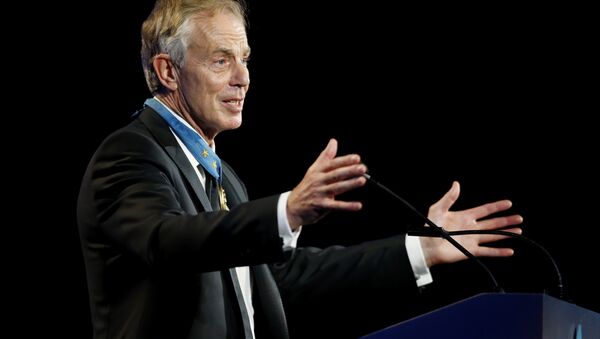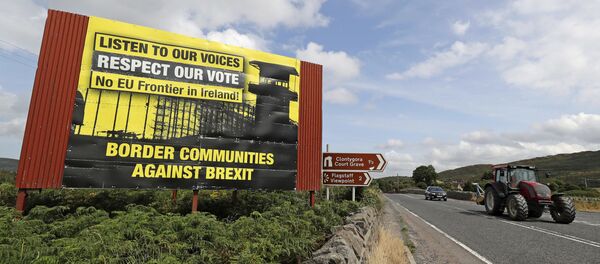'The only way the medium-sized [countries] don't get flattened in the land of giants is by banding together… We can take our place at the table of giants as a giant in our own right. You don't need to give up your nation state, you just need to have the ability, economically and politically, to defend your values and advance your interests', Blair said on Wednesday at the Financial Time's "Brexit and Beyond" conference in London.
According to the former prime minister, in the middle of the 21st century the international arena will be dominated by three giants — China, the United States and possibly India — and the only option for smaller countries to deal with these superpowers would be to unite as another giant, the one centered around the European Union.
UK Staying in Customs Union Only Way to Ensure Frictionless Irish Border
The former UK PM noted that the only possible solution to the post-Brexit difficulties with the Irish border is to retain UK-wide membership in the EU Customs Union, as well as the bloc's Single Market, arguing that a full exit from the single market would be "incompatible" with the set goals.
Blair recalled that the UK government had made three main commitments during the Brexit negotiations: no hard border between Ireland and Northern Ireland, maintaining the same relationship with the European Union and leaving the EU Customs Union and Single Market.
'Anybody who studies the technical detail knows that these three things are mutually incompatible… The only way to have a frictionless border in Ireland is to be part of the Customs Union and part of the Single Market, at least for goods and agricultural products', he said at the Financial Time's 'Brexit and Beyond' conference in London, asked a relevant question by a Sputnik correspondent.
READ MORE: EU, UK Will Remain Allies, Partners and Friends After Brexit — Michel Barnier
Blair argued that UK Prime Minister Theresa May's efforts to compromise with both the European Union and UK Eurosceptics had culminated in an attempt to square the circle with regard to the Irish border issue.
'What is the basic Brexit problem? The basic problem is that a whole series of political positions were taken before people studied the technical consequences of those political positions', the former prime minister added.
READ MORE: UK Trade Minister Calls Failure to Deliver Brexit 'Most Dangerous' Outcome
Blair also went on to criticize the idea that the country's membership in the bloc deprived it of control over its own laws, arguing that during his 10-year tenure as prime minister, he had never encountered any difficulties with making his own policy in either domestic or international affairs.
'The thing I find really bizarre about the whole Brexit thing is how the country has been persuaded that we don't make our own laws… I literally do not remember a single moment in the whole of my ten years when there was something I wanted to do on health, on education, on taxes, on spending, on welfare, on war and peace… where Europe stopped me doing what we wanted to do', Blair stressed.
READ MORE: May Says Brexit Deal Secures 'Broadest Security Partnership in EU's History'
The politician served as the head of the UK government between 1997 and 2007.
The long-sought draft agreement on the Brexit conditions was finally revealed on November 14. According to the draft, London and Brussels agreed to establish an EU-UK single customs territory, with Northern Ireland set to be tied to some EU single market rules that are essential for avoiding a hard border.
European Union is one of the world's largest economic zones. According to The World Bank, in 2017, the bloc's GDP was only slightly lower than that of the United States, totaling $17.2 trillion versus $19.3 trillion worth of goods and services produced by the world's largest economy. Moreover, the European Union outran China by as much as $5 trillion.
On its own, however, the United Kingdom trailed behind both the United States and China with a $2.6 trillion GDP, but still lead India by less then $30 billion.
UK citizens voted to leave the European Union in a referendum in June 2016. The exit is expected to take place by late March 2019.



